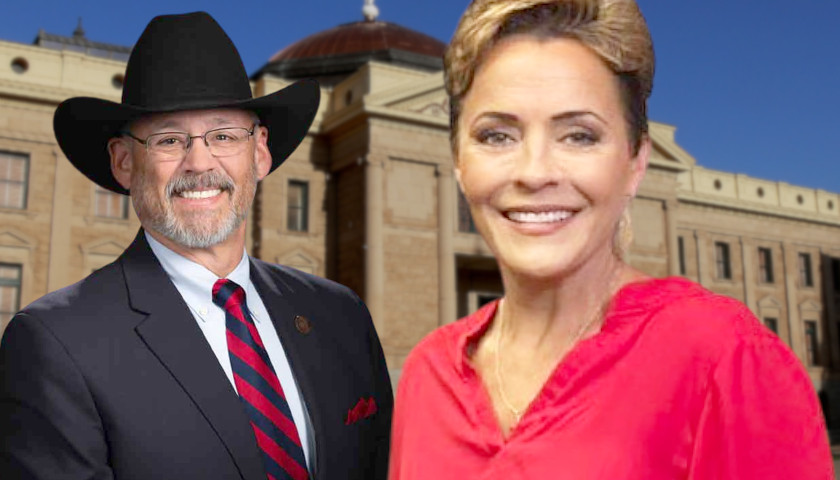Trump-endorsed Arizona gubernatorial candidate Kari Lake filed a lawsuit in April along with Trump-endorsed State Representative Mark Finchem (R-Oro Valley), who is running for Arizona secretary of state, to block the use of electronic voting machines to count ballots in the 2022 election. The Maricopa County Supervisors responded last week with a motion requesting sanctions against the pair and their attorneys, which include former Harvard Law School Professor Alan Dershowitz, asserting that the suit was “frivolous.”
Lake’s and Finchem’s attorney, Andrew Parker of Parker Daniels Kibort, retorted that the motion itself was “frivolous.” He told The Arizona Sun Times, “The motion brought be the County is frivolous and ignores the extensive allegations made in the Complaint supporting the legal claims. It also ignores the eye-opening evidence presented to the Court as part of the preliminary relief that has been sought. This appears to be a weak attempt to influence the Court while the Court has matters regarding this case pending before it. We believe it will not work. We will be responding in full to this improper attack within the next few days.”
Lake told The Sun Times, “We are drafting a response to the actions by Maricopa County. Our response will likely be filed this week. Our elections determine who we the people select to lead our counties, state and our country. We have a right to know that our votes are accurately counted without having to simply rely on these electronic voting machines with unfixable security failures.”
She went on, “There is an abundance of evidence to support our claims that electronic voting machines are not secure, easily compromised and lack transparency. The components for these machines are made by our adversaries. There are better, more secure, accurate, and honest ways to count our vote. We want every voter, no matter their political affiliation, to have faith in our election process. In light of all the evidence of issues, security breaches, etc., we the people will no longer accept, ‘just trust us,’ as a reason to accept the use of these machines.”
Finchem tweeted, “The threatened action by the Maricopa County Board of Supervisors, is nothing more than the attempted weaponization of the judicial process against the political process. If they can’t stand up to scrutiny for elections, that’s their problem — not our problem. Elections must be secure and trustworthy; Maricopa County has demonstrated neither is the case in the last election.”
The county’s motion, which was filed by Maricopa County Attorney Rachel Mitchell and outside legal counsel, said the lawsuit is attempting to “further a disinformation campaign and false narrative concerning the integrity of the election process in Arizona.” The county said the lawsuit is “based purely on speculation, conjecture, and unwarranted suspicion.” It accused the plaintiffs and their attorneys of pursuing “this matter for an improper purpose — namely to sow doubts about the reliability and trustworthiness of elections for their own financial and political benefit.” They assert that “plaintiffs repeatedly made false allegations” and “numerous factual misstatements.”
The county’s central argument focused on the “most blatant” and “false” statement in the lawsuit, the lawsuit’s mention of paper ballots. The lawsuit demanded that future elections be conducted on paper ballots “without using centralized machine-counting or computerized optical scanners.” The county asserted that this was evidence of “assertions that Arizonans do not vote on paper ballots,” which is “false” since Arizonans do vote using paper ballots.
However, the lawsuit did not say that current elections do not use paper ballots. It criticized the current system which uses paper ballots that are “tabulated together with the votes of other voters who cast ballots using an unreliable, untrustworthy electronic system.” The lawsuit called for revisions to the system so that paper ballots will be used without electronic voting machines.
The Maricopa County Supervisors have repeatedly dismissed the possibility of election fraud in the 2020 election, refusing to turn over subpoenaed items like routers and logs for the Arizona Senate’s independent Maricopa County ballot audit, issuing their own report claiming there was no fraud, and testifying to Congress that there was no fraud. Maricopa County Supervisor Bill Gates, a Republican, attacked Republican candidates who expressed concern about voter fraud, resulting in Republicans in the largest legislative district in the state, LD-3, censuring him and calling for his resignation.
Despite stonewalling from Maricopa County officials refusing to turn over requested items to his office as well, Arizona Attorney General Mark Brnovich issued an interim report in April on his investigation of the Arizona Senate’s independent audit, finding “serious vulnerabilities that must be addressed and [which raise] questions about the 2020 election in Arizona.” He cited 100,000 to 200,000 ballots which lacked a chain of custody, a signature verification system “insufficient to guard against abuse,” and “instances of election fraud by individuals who have been or will be prosecuted for various election crimes.”
A Rasmussen Reports poll taken in March found that 52 percent of voters believe it is likely that “cheating affected the outcome of the 2020 presidential election.” Significant margins in every demographic except liberal, Democrat, moderate, the wealthiest, and the highest education levels believe fraud was more likely than not.
A Monmouth University poll taken after the results of the independent Maricopa County ballot audit were presented last fall found that 73 percent of Republicans believe Joe Biden won the presidential election due to fraud.
– – –
Rachel Alexander is a reporter at The Arizona Sun Times and The Star News Network. Follow Rachel on Twitter. Email tips to [email protected].
Photo “Kari Lake” by Kari Lake. Background Photo “Arizona Capitol” by Wars. CC BY-SA 3.0.





